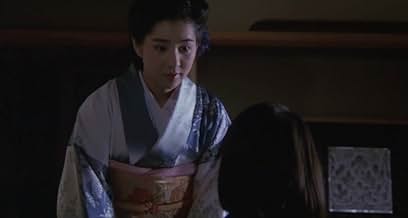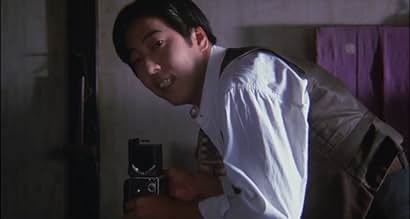VALUTAZIONE IMDb
7,2/10
1847
LA TUA VALUTAZIONE
Aggiungi una trama nella tua linguaThe orphaned Makioka sisters look for a husband for their third sister, Yukiko, as the rebellious youngest sister, Taeko, is kept waiting her turn.The orphaned Makioka sisters look for a husband for their third sister, Yukiko, as the rebellious youngest sister, Taeko, is kept waiting her turn.The orphaned Makioka sisters look for a husband for their third sister, Yukiko, as the rebellious youngest sister, Taeko, is kept waiting her turn.
- Regia
- Sceneggiatura
- Star
- Premi
- 5 vittorie e 9 candidature totali
Yonedanji Katsura
- Okuhata
- (as Kobeichô Katsura)
Michino Yokoyama
- Itani
- (as Michiyo Yokoyama)
Recensioni in evidenza
Kon Ichikawa probably is the director who most rightfully can be considered to be the successor of Yasujiro Ozu. At the beginning of his career he made a couple of war films, but later his subject was more and more the daily life of middle class families.
"The Makioka sisters" is a film from the second half of his career and is about the relationships between four sisters of a family in the Kimono business. All the sisters are different. The two oldest are married, number 3 and 4 are still single. The oldest one runs the external (business) relations, the second one runs the internal (family) relations. Number 3 is looking for a husband the traditional way and is choosy in this regard. Number 4, who can (according to tradition) only marry when number 3 is finally married, is more easy going. She finds the character of her potential boy friends more important than his social standing.
"The Makioka sisters" was a film in honor of the 50th anniversary of the production company, so the film had to be a little festive. Situating the film in a family in the kimono business enabled Ichikawa to use bright colors, and in this respect the film reminded me of "Ju Dou" (1990, Zhang Yimou).
Due to the possibility of using bright colors in a film and not in a book, one is inclined to say that in this case the film must be better than the book. Some years ago I read (another) book from the writer Jun'ichiro Tanizaki and now I am not so sure anymore. Tanizaki turned out to be a very subtle writer. Maybe I need to read "The Makioka sisters" some day to come to a final judgement.
"The Makioka sisters" is a film from the second half of his career and is about the relationships between four sisters of a family in the Kimono business. All the sisters are different. The two oldest are married, number 3 and 4 are still single. The oldest one runs the external (business) relations, the second one runs the internal (family) relations. Number 3 is looking for a husband the traditional way and is choosy in this regard. Number 4, who can (according to tradition) only marry when number 3 is finally married, is more easy going. She finds the character of her potential boy friends more important than his social standing.
"The Makioka sisters" was a film in honor of the 50th anniversary of the production company, so the film had to be a little festive. Situating the film in a family in the kimono business enabled Ichikawa to use bright colors, and in this respect the film reminded me of "Ju Dou" (1990, Zhang Yimou).
Due to the possibility of using bright colors in a film and not in a book, one is inclined to say that in this case the film must be better than the book. Some years ago I read (another) book from the writer Jun'ichiro Tanizaki and now I am not so sure anymore. Tanizaki turned out to be a very subtle writer. Maybe I need to read "The Makioka sisters" some day to come to a final judgement.
The Makioka Sisters isn't really my kind of film, owing to it mostly being about matchmaking and set some decades ago (at least on the surface; there's a little more to chew on beyond the premise). That being said, I found enough to like here.
As the title might imply, the sisters really take charge here, and it was refreshing to watch a film like this set as far back as the late 1930s (to my knowledge, a very culturally conservative time in Japan's history) have female characters with agency who took charge. Mainly, it's the two older sisters of the four looking over the two younger sisters, given they've all been orphaned, with the two older siblings sometimes butting heads while doing what's right for the younger ones. They all feel like they have something of a say over where they're going in life (I guess the older siblings more so than the younger ones, but still), and that was good to see, and I imagine inspiring.
The acting is all solid. Male characters are put in the background, but aren't just there to be mocked or ridiculed. It feels like a feminist movie in a slightly more relaxed way than this premise might be done today, and I think I respect it for that. It's all nice and real and genuine, and doesn't call attention or show off regarding how much agency it's giving its female characters; it's not just doing it to get applause or grandstand.
The film also looks nice, which I think can be said about anything Kon Ichikawa directed. Unfortunately, it is a little long, at 140 minutes. Maybe about 110 minutes would've felt like the sweet spot for me, but trying runtime aside (it's a little boring in parts), I did mostly like The Makioka Sisters.
As the title might imply, the sisters really take charge here, and it was refreshing to watch a film like this set as far back as the late 1930s (to my knowledge, a very culturally conservative time in Japan's history) have female characters with agency who took charge. Mainly, it's the two older sisters of the four looking over the two younger sisters, given they've all been orphaned, with the two older siblings sometimes butting heads while doing what's right for the younger ones. They all feel like they have something of a say over where they're going in life (I guess the older siblings more so than the younger ones, but still), and that was good to see, and I imagine inspiring.
The acting is all solid. Male characters are put in the background, but aren't just there to be mocked or ridiculed. It feels like a feminist movie in a slightly more relaxed way than this premise might be done today, and I think I respect it for that. It's all nice and real and genuine, and doesn't call attention or show off regarding how much agency it's giving its female characters; it's not just doing it to get applause or grandstand.
The film also looks nice, which I think can be said about anything Kon Ichikawa directed. Unfortunately, it is a little long, at 140 minutes. Maybe about 110 minutes would've felt like the sweet spot for me, but trying runtime aside (it's a little boring in parts), I did mostly like The Makioka Sisters.
We saw this beautiful movie several years ago at a Pacific Film Archive showing. We had read the book and found the film followed it faithfully and was gorgeously photographed. We just wish we knew if and when it will ever be made available on DVD or videotape. It was a pleasure to see a film that depicts life in nearly modern Japan with realistic people and locations. We have seen so many "studied" and arty films or medieval Japan that this one has remained a favorite ever since. We were pleased when a beautiful copy of "The Leopard" was released last year and hope that something this classic and beautiful can be made available to viewers.
One should first read The Makioka Sisters by Junichiro Tanizaki to better understand this film. It is a very great novel about the life of four middle-class sisters in Osaka, Japan in the 1930's. The book describes in great detail the many subtleties of life in Japan which a Westerner can miss understanding in the film. The film rather closely follows the book and is very beautifully photographed.
"Each sister is engaged in their own affairs, but Ichikawa's film (its Japanese title can be literally translated as "light snow") allots the lion's share to Sachiko and Yukiko, and the matchmaking arrangement preceded by precise calculation of all the conceivable conditions ("background" should be investigated through and through, no mentally disturbed mother-in-law lurking in the dark), the sheer canniness and the business-like action is astounding (death certificates of diseased wife and children are tossed over the dinner table), and Yukiko, played by beloved Japanese actress Yoshinaga with a comely reticence, extraordinarily wears down the mounting pressure and grinding process, to claim her hard-won victory, a good match is worth the wait, especially when eligible ones are few and far between during the wartime; whereas Sakuma, so adroitly embodies Sachiko's diligence and tenuous discomposure under a painstakingly maintained graciousness that comes naturally with age and savoir faire."
read my full review on my blog: cinema omnivore, thanks
read my full review on my blog: cinema omnivore, thanks
Lo sapevi?
- QuizThe story spans the period from autumn, 1936, to April, 1941, ending about seven months before the Japanese attack on Pearl Harbor. The novel references a number of contemporary events, such as the Kobe flood of 1938, the Second Sino-Japanese War, and the growing tensions in Europe.
- BlooperTaeko is clearly wearing a strapless bra when she's in the bathtub.
- ConnessioniReferenced in Nichinichi kore kôjitsu (2018)
I più visti
Accedi per valutare e creare un elenco di titoli salvati per ottenere consigli personalizzati
Dettagli
Contribuisci a questa pagina
Suggerisci una modifica o aggiungi i contenuti mancanti

























